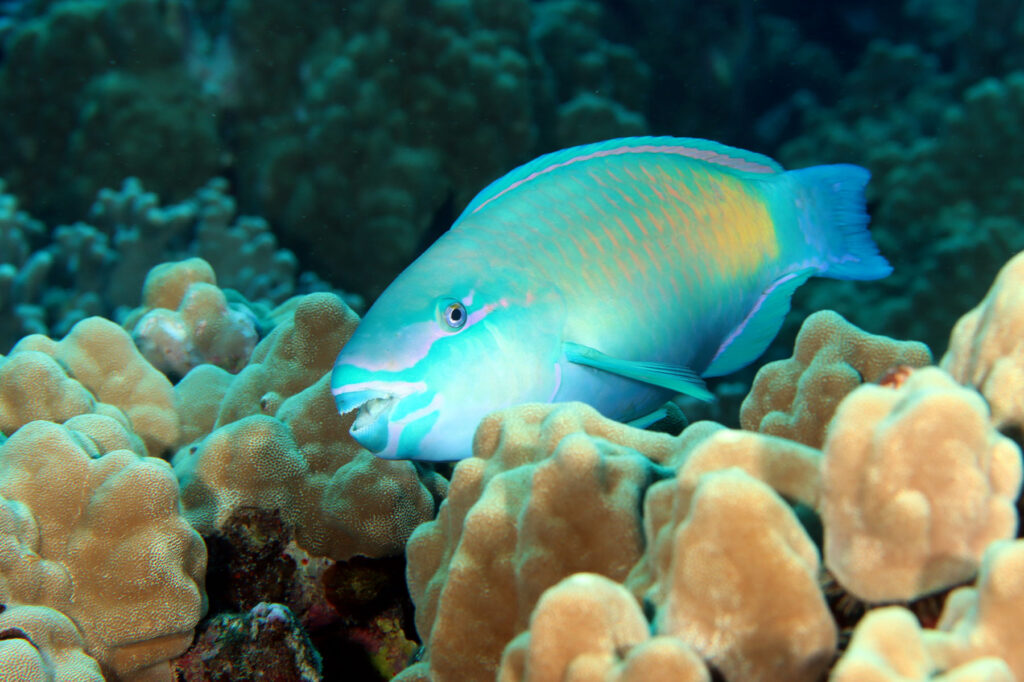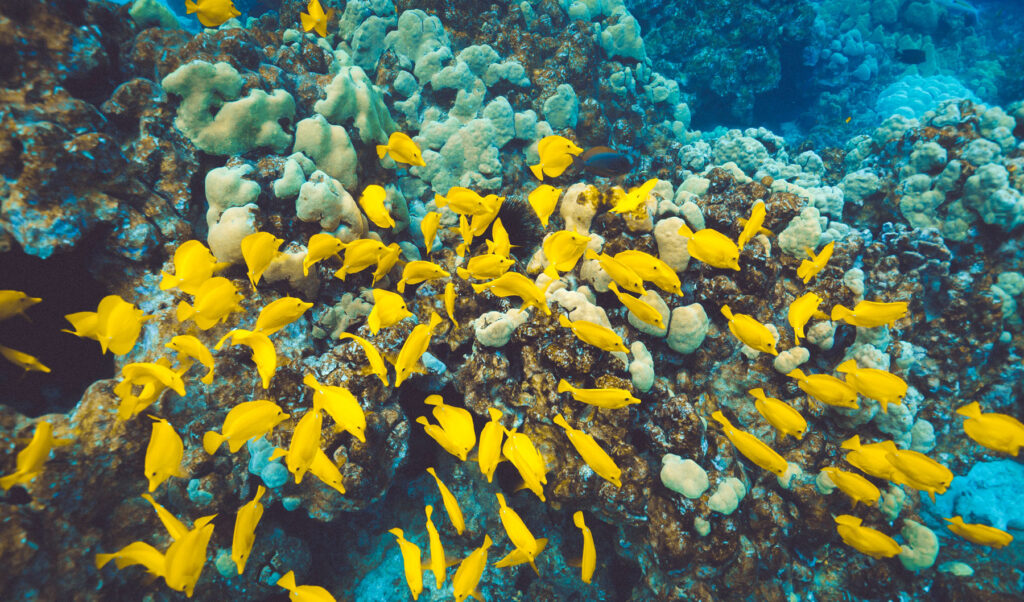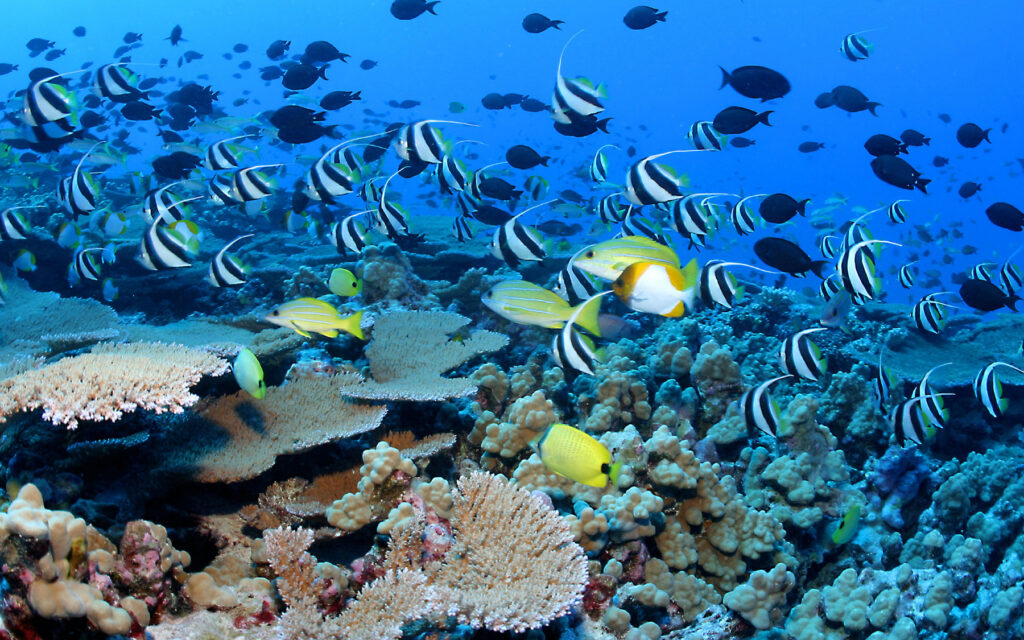Coral reefs, rainforests of the sea, are magnificent and diverse ecosystems teeming with life. Within this underwater wonderland, herbivore fish emerge as unsung heroes, playing a pivotal role in maintaining the delicate balance that sustains these vibrant reefs. Remarkable creatures like parrotfish and surgeonfish serve as nature’s custodians, diligently preserving the health of coral reefs by curbing the growth of algae, which, if left unchecked, can pose significant threats to the entire ecosystem.
The Remarkable Parrotfish and Surgeonfish
Among the many herbivorous fish species, parrotfish and surgeonfish stand out for their remarkable contributions.
Parrotfish, in particular, exhibit a fascinating life cycle. They are protogynous hermaphrodites, beginning their lives as females and later transitioning into males as they grow and environmental factors change. (What?!) Living in harems, where one dominant male controls a group of females, parrotfish are essential for maintaining the delicate balance within the group. If the alpha male is removed, it takes several months for a female to transition into the male role, impacting the reproductive cycle of the school.

Surgeonfish, with their distinctive spines and vibrant colors, are another vital component of coral reef ecosystems. Their constant grazing on algae prevents it from smothering and harming the corals, ensuring the reefs remain healthy and vibrant. These herbivorous fish species, with their unique traits and behaviors, contribute significantly to the overall resilience of coral reefs.
The Role of Herbivore Fish in Coral Reef Health
Herbivorous fish are voracious grazers, constantly feeding on algae that grow on coral reefs. Algae, when left uncontrolled, can outcompete corals for space and sunlight, eventually smothering them. By keeping algae in check, herbivore fish help to maintain the growth and vitality of corals, ensuring the reef ecosystem thrives.

Moreover, some herbivores, like parrotfish, also aid in coral growth by nibbling on dead coral. This seemingly destructive behavior promotes the development of new polyps, enhancing the growth and regeneration of corals. These natural processes, guided by the activities of herbivorous fish, are essential for the overall health and biodiversity of coral reefs.
The Threats to Herbivore Fish Populations and Their Impact on Coral Reef Health
While herbivore fish are indispensable guardians of coral reefs, their populations face numerous threats, with overfishing being one of the most pressing concerns.
Overfishing disrupts the natural balance within herbivore communities, leading to a decrease in their numbers. When these essential fish are overharvested, the algae they would have consumed takes over. As a result, corals become vulnerable, facing increased competition for space and sunlight, and are more susceptible to diseases. The ramifications of overfishing echo through the entire ecosystem, impacting not only the herbivore fish but also the corals, other marine life, and, ultimately, the communities that depend on these reefs for their livelihoods.
Pollution, including agricultural runoff, plastic waste, and chemicals, can contaminate the water, disrupting the delicate balance of the reef ecosystem. Prolonged exposure to pollutants weakens the immunity of corals and herbivore fish, making them more susceptible to diseases and other stressors.
Climate change exacerbates these challenges. Rising sea temperatures due to global warming cause coral bleaching, a phenomenon where corals expel the symbiotic algae living in their tissues, leaving them vulnerable and colorless. Ocean acidification, another consequence of climate change, hampers the ability of corals to build their calcium carbonate skeletons, making them weaker and more susceptible to damage.

What makes these threats particularly concerning is their interconnected nature. Overfishing weakens herbivore fish populations, making them less resilient to other stressors such as pollution and climate change. Likewise, the impacts of pollution and climate change, such as coral bleaching and weakened corals, create additional challenges for herbivore fish by reducing the availability of suitable habitats and food sources.
Preserving Herbivore Fish Populations for Healthy Coral Reefs
Addressing these threats requires a comprehensive approach that involves sustainable fisheries management, reducing pollution, and mitigating climate change. Conservation efforts, such as those championed by organizations like Fishpono, are instrumental in raising awareness, conducting research, and implementing initiatives to protect herbivore fish populations and coral reefs.
By implementing and enforcing regulations on fishing, promoting responsible tourism, reducing pollution, and actively combating climate change, we can safeguard herbivore fish populations. In doing so, we not only protect these remarkable species but also uphold the resilience and vitality of coral reefs.
Together, through collective action and a shared commitment to marine conservation, we can ensure that herbivore fish continue their vital role as guardians of coral reefs, preserving these magnificent underwater ecosystems for generations to come. Here’s to a future where the unsung heroes of the coral reefs thrive, and the reefs themselves continue to enchant and inspire us all.

